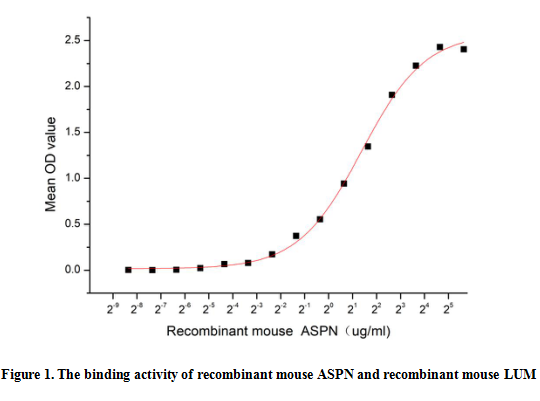Active Asporin (ASPN)
PLAP1; SLRR1C; Periodontal ligament-associated protein 1
- Product No.APC321Mu01
- Organism SpeciesMus musculus (Mouse) Same name, Different species.
- Buffer FormulationPBS, pH7.4, containing 0.01% SKL, 5% Trehalose.
- TraitsFreeze-dried powder
- Purity> 90%
- Isoelectric Point8.8
- ApplicationsCell culture; Activity Assays.
- Download Instruction Manual
- UOM 10µg50µg 200µg 1mg 5mg
-
FOB
US$ 270
For more details, please contact local distributors!US$ 675
For more details, please contact local distributors! US$ 1350
For more details, please contact local distributors! US$ 4050
For more details, please contact local distributors! US$ 10125
For more details, please contact local distributors!
ACTIVITY TEST of the Active Asporin (ASPN)

Asporin (ASPN) is a protein belongs to a family of leucine-rich repeat (LRR) proteins implicated in cancer, osteoarthritis, and periodontal ligament mineralization. The protein negatively regulates chondrogenesis in the articular cartilage and periodontal ligament (PDL) differentiation, inhibits BMP2-induced cytodifferentiation of PDL cells and also nhibits the interaction between TGFB1 and TGF-beta receptor type II in the presence of heparin/heparan sulfate in vitro. In addition Lumican (LUM) and ASPN can contribute to the fibrinogenesis of cardiac remodeling of ICM, thus a binding ELISA assay was conducted to detect the interaction of recombinant mouse ASPN and recombinant mouse LUM. Briefly, ASPN were diluted serially in PBS, with 0.01% BSA (pH 7.4). Duplicate samples of 100 μl were then transferred to LUM-coated microtiter wells and incubated for 2h at 37℃. Wells were washed with PBST and incubated for 1h with anti-ASPN pAb, then aspirated and washed 3 times. After incubation with HRP labelled secondary antibody, wells were aspirated and washed 3 times. With the addition of substrate solution, wells were incubated 15-25 minutes at 37℃. Finally, add 50 µL stop solution to the wells and read at 450 nm immediately. The binding activity of recombinant mouse ASPN and recombinant mouse LUM was shown in Figure 1, the EC50 for this effect is 2.6 ug/mL.
USAGE of the Active Asporin (ASPN)
Reconstitute in 10mM PBS (pH7.4) to a concentration of 0.1-1.0 mg/mL. Do not vortex.
STORAGE of the Active Asporin (ASPN)
Avoid repeated freeze/thaw cycles. Store at 2-8°C for one month. Aliquot and store at -80°C for 12 months.
STABILITY of the Active Asporin (ASPN)
The thermal stability is described by the loss rate. The loss rate was determined by accelerated thermal degradation test, that is, incubate the protein at 37°C for 48h, and no obvious degradation and precipitation were observed. The loss rate is less than 5% within the expiration date under appropriate storage condition.
INCREMENT SERVICES
BCA Protein Quantification Kit
Molecular Mass Marker for Protein
Monoclonal Antibody Customized Service
Polyclonal Antibody Customized Service
Protein Activity Test Experiment Service
Electrophoretic Mobility Shift Assay (EMSA) Experiment Service
Buffer
Lentivirus Packaging Experiment Service
Adenovirus Packaging Experiment Service
Real Time PCR Experimental Service
Spike RBD Protein (S-RBD)
Protein G
Protein A
Related products
| Catalog No. | Organism species: Mus musculus (Mouse) | Applications (RESEARCH USE ONLY!) |
| RPC321Mu02 | Recombinant Asporin (ASPN) | Positive Control; Immunogen; SDS-PAGE; WB. |
| APC321Mu01 | Active Asporin (ASPN) | Cell culture; Activity Assays. |
| RPC321Mu03 | Recombinant Asporin (ASPN) | Positive Control; Immunogen; SDS-PAGE; WB. |
| RPC321Mu04 | Recombinant Asporin (ASPN) | Positive Control; Immunogen; SDS-PAGE; WB. |
| RPC321Mu01 | Recombinant Asporin (ASPN) | Positive Control; Immunogen; SDS-PAGE; WB. |
| PAC321Mu02 | Polyclonal Antibody to Asporin (ASPN) | WB; IHC; ICC; IP. |
| PAC321Mu01 | Polyclonal Antibody to Asporin (ASPN) | WB; IHC; ICC; IP. |
| SEC321Mu | ELISA Kit for Asporin (ASPN) | Enzyme-linked immunosorbent assay for Antigen Detection. |
| LMC321Mu | Multiplex Assay Kit for Asporin (ASPN) ,etc. by FLIA (Flow Luminescence Immunoassay) | FLIA Kit for Antigen Detection. |

